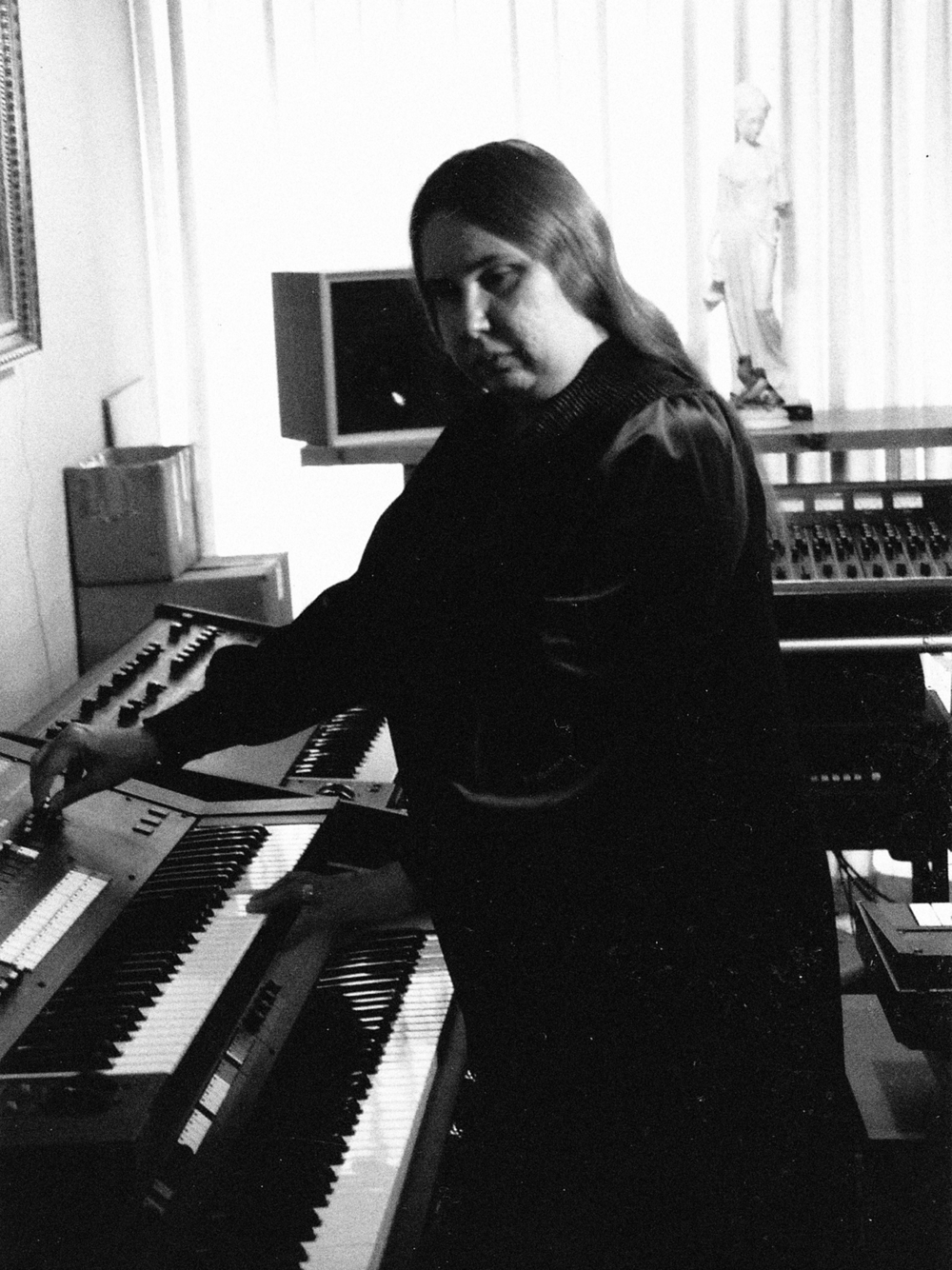Section Branding
Header Content
Music From The Mind's Eye
Primary Content
On the cover of Pauline Anna Strom's 1982 debut, a Dali-esque eye hatches from a skyborn egg, framed by a rainbow wrapped around the cosmos. The image, painted by Richard "Karma" Moffett, sits against a plateau of perfect white; ornate calligraphic text is superimposed at the top and bottom, powder blue like the atmosphere. Like that visual introduction, the alias under which Strom recorded, Trans-Millenia Consort, instantly conveyed the epoch-spanning otherness of the Bay Area synthesist's instrumental space music. Initially, it took the form of mellow waves and pulses, evocative soundscapes with titles like "Emerald Pool." The sonics would grow sharper and more discordant, but her work never strayed from its freewheeling take on memory and consciousness, always committed to exploding the idea of time as a straight line.
While Strom's musical journeys played across time and space, her physical life ended definitively and abruptly in one place — her San Francisco apartment on Dec. 13, 2020, of causes not specified publicly. Strom was 74, and looking forward to the release of her first new music in over 30 years. In the past decade, her work had found a dedicated and growing fanbase, first through blogs, then YouTube, and eventually through a 2017 compilation, Trans-Millenia Music, released by New York label RVNG Intl. Her new album, Angel Tears in Sunlight, was intended to be the creative rebirth of an artist silent for too long.
Strom was born in Baton Rouge, La., in 1946, and complications at birth left her blind. She grew up in a Roman Catholic household in Kentucky, developing an early love for classical music. Her disability made school an unfriendly place: "If I had to stand up to say something in class, I'd be laughed at," she said in 2017. Strom dropped out of high school and drifted around the South until she met and married an army man, whom she followed to a post in San Francisco. "It was like the middle ages to the modern world," she said of the move to California, where in the early 1970s far-out spiritualism swirled amidst burgeoning technologies. "It felt like a place where you could be whoever you wanted to be."
When her husband was away on duty, Strom used a Victor "talking book" machine to immerse herself in literature — sci-fi, horror, history, Egyptology — and also tuned in to the strange new sounds of European kosmische, broadcast during Stephen Hill's Hearts of Space radio show. The eerie electronics of Tangerine Dream and Klaus Schulze were frequent and welcome companions.
On 1982's Trans-Millenia Consort, she channeled these influences into one-of-a-kind new age music. Its centerpiece, "Energies,'' is an iridescent reverie of layered synth lines buoyed along by a faint, shuffling beat; the track conveys a starry brightness Strom could only have imagined in her mind's eye. In the mid-'80s she divorced and remarried, and her music became stranger and more avant-garde. She experimented with field recordings of airport jets and wildlife; she dabbled in foley, simulating the sounds of a physical assault by dunking a cabbage in water. On 1988's Aquatic Realms, Strom tested the power of synthesis itself, recreating oceanic undulations with her beloved Sequential Circuits Prophet-10. This was one of four self-released cassettes from that year, each of which swept listeners away to a different point in the space-time continuum. Another was titled Japanese Impressions — a serene and sparse evocation of an environment she'd never physically visited.
Then, seemingly all of a sudden, the music dried up. Liner notes to the 2017 compilation refer to intensifying "money problems." She sold her equipment and records, and focused on building a spiritual healing business from home as a reiki practitioner. Musically, at least, the Trans-Millenia Consort went quiet, leaving a catalog that would drift into obscurity, waiting to be rediscovered.
Angel Tears in Sunlight, out Feb. 19, is the sound of Strom firmly in her panoramic groove — an excavation of the self summoned as an unending musical horizon. Making the album was not easy, and its arrival caps off nearly 10 years of conversations with RVNG label head Matt Werth and a heap of collaborative problem-solving.
Since 2011, Strom had expressed a desire to start composing again, but it wasn't until Trans-Millenia Music officially rebooted her career that the gears began turning. Werth liaised with various synth manufacturers on Strom's behalf before the artist settled on the Korg workstation she would use for most of the album. Her longtime friend John Jennings — also the doorman of her apartment block — painstakingly read and recorded all of the device's instructions into her talking book, and helped learn its physical properties by guiding her hands across it. (Sadly, Jennings didn't live to see the album's completion. Strom dedicated Angel Tears to him, describing her confidant as "patient, understanding, and free of judgement.")
In September 2019, the first batch of new music materialized — a deluge of over 50 tracks, some more than 30 minutes in length. Werth describes the rush of sounds as "overwhelming" but "truthful," both "invigorating" and "encouraging" for him and the RVNG team. "It wasn't like she had her toe in the water," he says. "She was immersed in her music-making again. It felt so free, like she was floating in that immersion and really enjoying the expression."
Werth and composer John Also Bennett worked together to whittle the recordings to song length. Strom had sent full stereo tracks, rather than isolated "stems" of each instrument voice, which meant Werth and Bennett weren't able to alter the minutiae of each composition — only the whole. It was an editing process in the cinematic sense: From a wealth of material, the pair zoned in on specific sections, sculpting a story from the emotions and dynamics.
Bennett didn't converse directly with Strom, but he characterizes their communication as happening through the music itself: "There was a tiny Paula in my head," he says. "She worked intuitively, and so I was following that; trusting that my own intuition was on the same level as hers." While COVID-19 raged across the U.S., Werth and Strom assembled the final pieces of the puzzle over the phone — confirming edits, workshopping track titles, getting the finished product ready for the world.
If Trans-Millennia Music was a reintroduction, Angel Tears in Sunlight could fairly be called a fresh start. Longtime listeners will perhaps hear echoes of Strom's earlier work: "Tropical Convergence'' and "Equatorial Sunrise'' recall the heavenly vistas of her debut, and the staccato vocals of "Marking Time" embody an alien strangeness reminiscent of 1984's vampish Spectre. She worked alone at home, as she always had, fashioning tracks into the early hours when "the energy was slowed down." But with the analog synthesizers which formed the molten bedrock of her old recordings now replaced by modern digital hardware, the sound is crisper. Chimes ring with computational clarity; sonorous wisps hold their shape a little longer.
"New age music, even the good stuff, is generally palliative," says Erik Davis, a writer and scholar of new age culture. "But Strom's music is more like a journey, a movement from the here and now towards the simultaneously ancient and futuristic." As he puts it, the musician was "inhaling the air" of Californian culture in her 1980s work — the "commitment to personal transformation, the influence of nature, and a profound gear fetishism" — but combining it with the darker synth music coming out of Europe at the time. (The continent returned the favor: While Strom was a self-avowed loner at home, removed from a local scene she described as "phony," European distributors stocked and restocked her records.)
Strom's exposure in recent years has coincided with a wider resurfacing of new age music in the cultural imagination. The singer and musician Caroline Polachek, whose output in the past dozen years has ranged from Apple-approved avant-pop to an album of abstract sine-wave instrumentals, interviewed Strom in 2018. "The steering comes from below," Polachek says of the artist's compositional style. "There's no choruses, no symmetry, no repetition. And if there is repetition, it falls back and allows for a bigger dynamic statement to take the foreground."
In many ways, the immersive qualities of Strom's work have become a staple of electronic music production at large, heard in the output of artists such as Oneohtrix Point Never and Kaitlyn Aurelia Smith. Like those descendents, Strom was an exacting linguist, her song titles capturing the essence of her compositions to an uncanny degree. A highlight of the new album, "Small Reptiles on the Forest Floor," precisely evokes its title, its scuffling textures like rustling leaves in a prehistoric setting. The track is so visually articulate, the sonic contours so carefully drawn, that it feels as if you could step into it.
The day he learned of Strom's death, Werth says, "It came out of the blue." He'd woken up to emails from the artist's sister, concerned that her correspondence had slowed. From there, "Everything started to crumble."
There is a bittersweetness in understanding that the appeal of Strom's music grew in part from her isolated circumstances. At times it feels uniquely utopian, carrying the possibility that machines can facilitate the creation of wondrous new worlds and transcend the limitations of the body. Even way back on her debut, "Morning Splendor" speaks to this potential, a supple piece that begins like an astral nursery rhyme before morphing into rich electronic impressionism. It remains her sweetest track — a testament to Strom's ability to translate imagined visuals into disarmingly vivid sounds. As Werth puts it, she created "a more intimate portrait of synthesizer music" for the world, expressive rather than escapist.
If nothing else, Pauline Anna Strom's music is her imagination, rendered in the medium she used to experience the material world. Her machines, and her public life as Trans-Millenia Consort, were her way of extracting and channeling these visions for the rest of us. Angel Tears in Sunlight is a stark final statement, crystalline in its clarity, its orientation toward a metaphysical experience perhaps even more apparent now that she's gone. But it's tempting to imagine that she's merely traveled to the same celestial space her compositions evoke: a sky filled with billions of particles, each one refracting the light that seemed to course throughout her music.
Lewis Gordon is a journalist and writer based in Glasgow. He has written about culture and technology for Vice, The Verge, The Nation and others.
Copyright 2021 NPR. To see more, visit https://www.npr.org.


